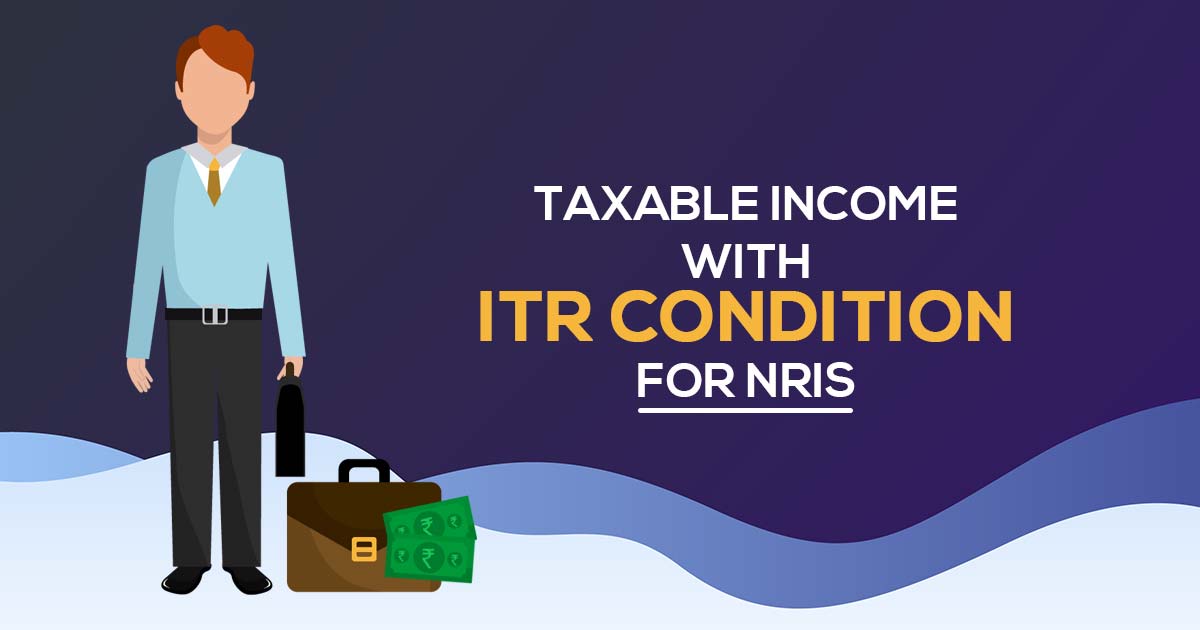
NRIs (non-resident Indians) are Indian citizens who reside outside of India yet still have close ties to the country. They must pay taxes and submit their income tax returns if they plan to keep earning money in this nation. This important article will give you information about taxable income with income tax return filing conditions in India.
Simple to Understand About an NRI
If someone is considered an NRI for tax reasons, specific criteria must be followed. If a person spends fewer than 182 days in India during the fiscal year or less than 60 days in India during the fiscal year, and less than 365 days throughout the four fiscal years prior, they are deemed NRIs.
Taxable Income for the NRI in India
Income received or deemed to have been received in India, as well as income accruing or arising or being assumed to have accrued or arisen in India, are all included in an NRI’s taxable income in India.
If the source of the income is located in India, such as rental income from a property, dividends from an Indian corporation, and others, then the money is often considered to accrue or arise in India.
The nexus rule has one exception. Interest earned from a non-resident external (NRE) account, despite having a link with India, is tax-free in India.
In India, an NRI’s worldwide income is not taxed.
Income Tax Deductions Available for NRI
Most Section 80C deductions up to Rs 1.5 lakh are available to NRIs. They include the costs of life insurance, National Pension System payments, medical insurance premiums, preventative health checkups, other medical expenses, interest on student loan debt, etc.
Up to a maximum of Rs 10,000, deductions may be made on the interest income from a savings account held with an Indian bank, cooperative society, or post office.
Foreign Currency Non-Resident (FCNR) bank deposits and notified bonds both offer tax-free interest income to NRIs.
Tax Deductions Not Available for NRI
Some other deductions available to local Indians are not available to NRIs. NRIs are not permitted to invest in tax-saving programs like the Public Provident Fund, Senior Citizens Savings Scheme, National Savings Certificate, or Post Office Deposit Scheme.
Deductions for medical costs expended on a family member with a handicap, costs associated with the treatment of specific diseases, and the Section 80TTB deduction on interest income available to senior citizens are also not permitted.
ITR Filing Condition for NRIs
If an NRI’s total income in India exceeds Rs 2.5 lakh, he must submit a return there. NRIs can choose between the old and the new taxation regime.
Read Also: Easy Explanation on TDS for Property Sale by NRI
An NRI is not required to submit a Section 139 income return if his entire income exclusively comprises Section 115A income (royalty, fees for technical services, dividends, and interest), or investment income on which TDS (tax deducted at source) has been deducted.
Taxation for the Transactions of the Property
A person who buys a property in India from an NRI is required to deduct TDS, which can equal up to 12.5% of the sale price of the property. The amount of tax due is less when the cost of the property is taken into account. An NRI might go to the tax office and ask for a certificate to be issued. The buyer might deduct TDS at a reduced rate as a result of it. So, NRIs can prevent having their funds frozen.
Chopra continues by stating that NRIs should also pay capital gains tax when they sell a property in India and must deduct TDS from any rent payments made on property located in India.
DTAA Benefits for NRIs
By utilizing the Double Taxation Avoidance Agreements (DTAAs) ratified between India and other nations, NRIs can lessen their tax burden. By the conditions of the DTAA, they can either claim credit for taxes paid in India in their place of residency or seek exemption from tax in India.
Most Important Aspects of DTAA
- A tax treaty known as the Double Taxation Avoidance Agreement (DTAA) was struck between nations to assist taxpayers in not paying taxes on identical income twice.
- It applies when a person is a resident of one country but generates money in another.
- The interest generated on fixed deposits and savings bank accounts kept in India, the income from real estate owned in India, and capital gains from the sale of assets in India are all subject to the DTAA’s provisions.
- Taxes are deducted from the aforementioned incomes at a reduced rate if an NRI utilizes DTAA provisions.









